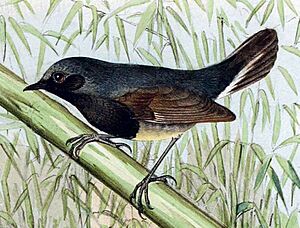Blackthroat facts for kids
Quick facts for kids Blackthroat |
|
|---|---|
 |
|
| Male, drawn by Gustav Mützel, 1891 | |
| Conservation status | |
| Scientific classification | |
| Genus: |
Calliope
|
| Species: |
obscura
|
| Synonyms | |
|
Luscinia obscura |
|
The blackthroat (Calliope obscura) is a super rare bird. People also call it the black-throated robin or black-throated blue robin. It belongs to the Muscicapidae family, which includes many small songbirds. This bird lives and has its babies in central China. We don't know where it goes for winter. Sometimes, it flies far away, like to Thailand, but that's unusual. It loves to live in thick bamboo forests high up in the mountains, about 3,000 to 3,400 meters high. Sadly, its home is disappearing, which is a big problem for the blackthroat.
Contents
Discovering the Blackthroat
A Mysterious Bird
The blackthroat was first found in 1891. For over 120 years after that, very few blackthroats were ever seen. It was so rare that scientists called it "Asia's most enigmatic robin." This means it was the most mysterious robin in Asia. No one had even clearly identified a female blackthroat for a long time.
Finding Their Secret Homes
In June 2011, a team of scientists made an exciting discovery. They found where blackthroats have their babies! This special place is in the Qinling Mountains in Shaanxi Province, central China. The team saw seven singing male blackthroats in one nature reserve. They saw seven more in another nearby reserve. This was almost as many as had been seen in total before!
Seeing a Female Blackthroat
Then, in 2014, something even more amazing happened. Scientists finally saw a female blackthroat! They also saw a pair of blackthroats together. This was a huge step in learning more about these shy birds.
Blackthroat's Family Tree
How Scientists Name Birds
The first official description of the blackthroat was made in 1891. Two Russian bird experts, Valentin Bianchi and Mikhail Berezovski, gave it its first scientific name. They called it Larvivora obscura.
Changing Names Over Time
Later, the blackthroat was placed in a different group, called the Luscinia genus. But in 2010, scientists did a new study. They looked closely at the birds' DNA. This study showed that the Luscinia group was not quite right. So, scientists split the group up. The blackthroat and some other birds were moved to a different, older group called Calliope. This is why its full scientific name today is Calliope obscura.


